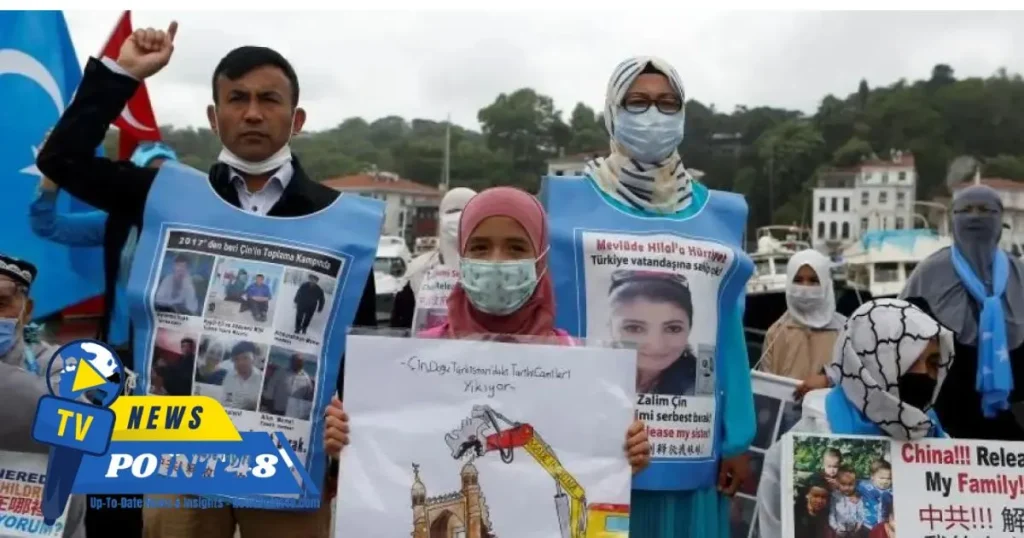
The discussion of human rights is still one of the most controversial and polarizing topics in the international arena. The USA also launched its annual Report on Human Rights, which rates China as one of the most evil defenders of human rights, and lands at the top of Google. That report assessing human rights practices around the world squarely criticizes China for its treatment of ethnic and religious minorities, including Uyghur Muslims and practitioners of Falun Gong and The Church of Almighty God.
The Trump administration has denounced China for cracking down on religious freedom, as well as its utilization of surveillance, imprisonment, and torture to silence opposition. The 2024 report reiterates these worries and focuses on allegations of crimes against humanity by China, especially in the Xinjiang province. This adds another layer, of global space unto itself with direct implications for two superpowers and a big political issues in the worst international sense of human rights.
Pattern of Abuse: Targeting Religious and Ethnic Groups
The State Department’s annual Human Rights Report provides a chilling description of China’s authoritarian grip on religious and ethnic minorities. The Uyghur Muslim community, the Falun Gong practitioners, and the Church of Almighty God members have all been some of the worst persecuted groups in China.
Xinjiang: The Worsening Persecution of the Uyghur Muslims

Perhaps the most disturbing portions of the report relate to the nearly indescribable tragedy faced by Uyghur Muslims in China’s Xinjiang province. According to the US, more than one million Uighurs and other Muslim minorities have been sent into “re-education camps” where they are tortured and forced to work. The so-called vocational training centers are widely considered to be internment camps for Uighurs and have been condemned by human rights groups as part of China’s wider clampdown on pro-Islamic militancy.
The report details surveillance, arbitrary detention and torture of Uighurs Former prisoners have reported being forcibly sterilized, sexually assaulted, and undergoing psychological abuse. This action has been referred to as genocide by the State Department of the United States, with the fact that China is seeking utopistically-& possibly successfully in practice- to eliminate Uyghurness from its land.
A Nearly Two-Decade-Long Persecution of Falun Gong

The spiritual practice, rooted in meditation and moral teachings known as Falun Gong, has been subjected to an intense persecution campaign by the Chinese Communist Party (CCP) since 1999. Americas PERÚ 2159 The U.S. Human Rights Report notes that Falun Gongpractitioners continue to be tortured, imprisoned, and harassed. Many practitioners are subjected to forced organ harvesting — an allegation that has horrified the international community, the report says.
Despite this pressure and various investigations, China has always denied the existence of such practices, calling them politically motivated lies. Nevertheless, countless human rights groups and witness testimonies substantiate the CCP committed evil. It cites continued sweeps, in which Falun Gong practitioners are branded cult members and treacherous to the country.
The Church of Almighty God: How the Commission is Attacking Underground Christianity
The Church of Almighty God is another victim of draconian religious repressions in China and has been designated as a heretical cult by the state because of it. According to the U.S. report, police have arrested thousands of members, who under torture have confessed that they were liars and spies for a plot to eradicate religious faith.
The church underground has now transformed itself into one of the most heavily persecuted faith groups in China. The group goes underground, with many of its members escaping China to apply for asylum in safer places, convinced that they will be jailed or worse if they remain. This is all part of a larger threat to religious liberty in China that the government there views as a threat to its power, the report notes.
U.S. View: Human rights and foreign policy
The U.S. Human Rights Report is vital to the country’s international policy. The U.S. government is using its annual human rights report to stress such abuses thereby encouraging democratic behavior and such pressure on accused violators. For China, the report has turned into a diplomatic flashpoint that has made its relationship with the U.S. even worse than it was before.
How to know the World Responds to China’sHuman Rights Record At newspoint48
Western countries and global governing bodies have parroted U.S. condemnation of China on the issue also in its human rights enforcement, especially targeting oppression against Uyghurs, Falun Gong practitioners, and The Church of Almighty God members by China government agencies. New human rights abuses continue and numerous countries are taking steps to sanction the Chinese officials at the head of these actions. The Chinese government is facing demands for independent investigations into its activities in Xinjiang from the United Nations and denunciations from the European Union, which is calling on Beijing to be more forthcoming.
Nonetheless, not everyone agrees with the U.S. position. There is, however a hesitation on the part of some nations — notably in the Global South — to officially call out China over economic ties or certain political alliances. Through its Belt and Road Initiative, China massively aspires to be a major trading partner and investor in infrastructure, etc., so some countries are perhaps skeptical of doing anything against human rights that would risk damaging whatever relationship they have with Beijing.
Denying it: A Matter of Sovereignty for China
China has dismissed as politically motivated the allegations in the U.S. report, denying those and complaining that Xinjiang and other areas are misrepresented. Beijing defends its measures in the name of “fighting terrorism and safeguarding national security.” The U.S. depicts itself as being concerned about human rights, but it merely uses the rhetoric as a guise for interfering in China’s internal affairs.
This led Chinese officials to argue that the U.S. had no business criticizing other countries due to its problems of racial injustice, income inequality, and gun violence. State-controlled Chinese media highlights that such a move by the US is part and parcel of its broader policy to ‘stymie China’s rise. China has maintained the narrative that it is acting solely to safeguard its sovereignty and unify a diverse population through legal means.
Human rights in the big-power Olympics of geopolitics
The U.S.-China fight over human rights, it seems, is no longer all about high-level diplomatic summits and reports. This is a small part of the greater backdrop of a geopolitical power struggle between two global powers contesting for moral and political supremacy in an ever more interconnected world.
Implication on the U.S.-China Relationships
One of the biggest stumbling blocks in the U.S.-Chinarelationship is the debate over human rights. Human rights have outstripped trade, climate change, and technology as the most divisive sticking point. These concerns that routinely sour diplomatic meetings between the two countries mean Washington persists in sanctioning Chinese officials for human rights abuses.
These tensions extend to multilateral institutions such as the United Nations Human Rights Council, where China has repeatedly sought favorable treatment from developing countries opposed to Western interference in domestic political matters.
The Global Human Rights Struggle

An ever more critical international issue, illustrated by the Annual U.S. Report on Human Rights:… The human rights abuses are still taking place and intensifying in particular against Uyghurs, Falun Gong practitioners, and The Church of Almighty God. The U.S. must continue to pressurize China concerning its human rights practices as it is a vital part of its foreign policy agenda.
In our world which seems as if it is becoming more and more fractured or divided, human rights remain a recurrent issue that signifies not just individual freedoms, but effectively the global politics of power. For as long as China and the U.S. remain at odds on these problems, the struggle over human rights will remain central to their fraught interaction.
